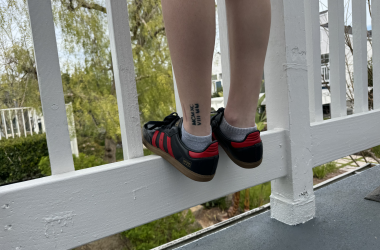Growing up, the idea of death is just a sad, abstract concept. A problem that is addressed when you’re older, successful and maybe even starting your own family.
We assume that our grandparents and other loved ones will peacefully pass away from old age in their sleep after living a fruitful life full of joy, love and endless adventures. Unfortunately, for many, that isn’t always the case.
When I was in third grade, one of my friends from school died a violent death. At 10 years old, he had drowned in a river during a boating incident. By the time I turned 14 years old, all of my grandparents had died. Some peacefully, some not so peacefully.
I grew accustomed to my loved ones fading away, but I was naïve and I assumed I wouldn’t have to face another death of a loved one for many years.
Last semester, my eldest brother died unexpectedly of a heart attack. After crying for a few hours and attempting to console my heartbroken parents, I finished an article I was writing for my remote job.
I didn’t take a day off or even a night off. I continued working and resumed my normal schedule as a way to avoid coping with the tremendous loss I was feeling. Avoiding this pain was the only thing I could think of doing.
In late January, one of my friends from high school died unexpectedly at 19 years old. I had no idea how to handle this news. I felt lost, useless, confused and angry.
Instead of handling my pain, I avoided it. Again. I came back to school and attempted to return to my normal life in Long Beach, completely in denial that I had lost two loved ones in the span of one month.
This is not a healthy response to loss nor is it an effective coping mechanism. I denied myself time to mourn and heal from these losses and this has caused detrimental effects on my mental and physical health.
I stopped eating for a while, my sleeping schedule worsened, my grades began to slip, and I’m still suffering from emotional breakdowns every week. Sometimes multiple times per week.
Students aren’t taught how to handle watching their loved ones die while attending school full-time and working multiple jobs. There’s no “How-to” when it comes to mourning, especially as a teenager or young adult, and there’s very little helpful advice readily available for those of us who are struggling.
According to psychologist Heather Servaty-Seib, a study indicated that 35 to 40 percent of college students experience the death of a family member or friend during their college experience.
Knowing these statistics, why isn’t there more resources being promoted for grieving students at all universities? Support groups can be found, but students have to go looking themselves, which is an extremely hard task for anyone experiencing grief.
As a result of these deaths, many students resort to unhealthy coping mechanisms including denial, over-eating or under-eating, self-isolation, and substance abuse. These mechanisms can be extremely detrimental to the student and their health.
There are hundreds of healthy coping mechanisms that will be more helpful in responding to loss, including exercising, starting on a new project, attending a support group, as well as reaching out to caring family and friends for support.
Physical activity has proven to help individuals process grief. Some activities that could be helpful are yoga, jogging, and even martial arts. By channeling your energy on a more positive and physically beneficial activity, it may help you in adapting to the loss.
Beginning a new, creative project has also been shown to assist negative feelings associated with grief. Many people have tried knitting, painting, journaling, and scrapbooking instead of participating in negative coping mechanisms, like drinking alcohol.
Considering joining a support group, contacting a medical professional, or reaching out to family and friends are also great ways to help gain support during your time of need. Handling the death of a loved one is an extremely painful experience, but you don’t have to do it on your own.
Asking for help is not an easy task, and oftentimes college students are so preoccupied attending school full-time and working multiple jobs, they don’t believe they have time to get help. However, there are multiple 24-hour hotlines open, as well as the many resources located on the CSULB campus.
CAPS at CSULB offers counseling for students and there are a variety of support groups located in Long Beach. Counseling services are high in demand at this time, but they are open for appointments. For more urgent assistance, CAPS offers the BEACH crisis text-line all day, every day.
It will be hard, but in order to receive help, you need to take the first step and ask. Although there is no “right” or “wrong” way to cope, there are healthy and unhealthy ways of handling your grief.
As someone who is currently grieving, I am taking the step towards developing more healthy coping mechanisms, and I hope if you are mourning the death of a loved one, you take that step too.




